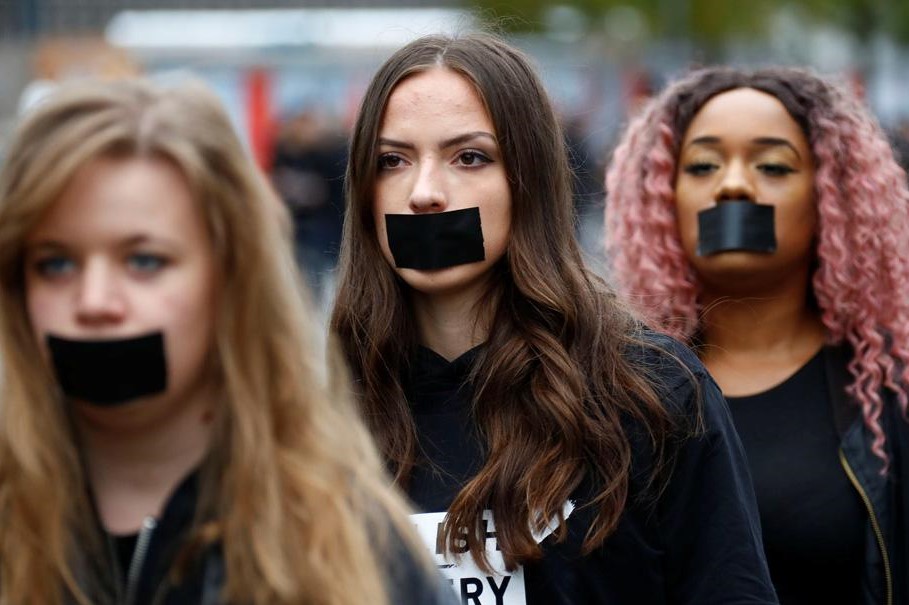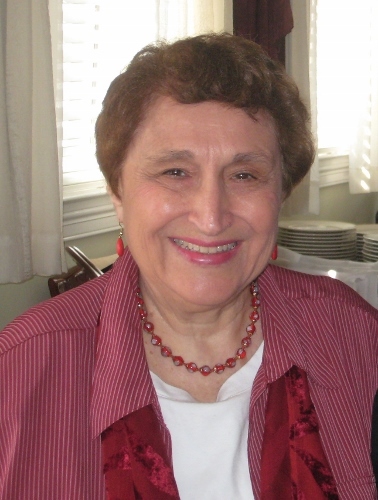
Activists in Berlin take part in a "Walk for Freedom" to protest human trafficking Oct. 20, 2018. (CNS/Fabrizio Bensch, Reuters)
Supply and demand are the key driving forces in any economy. Suppliers respond to what people want, whether it's gas-guzzlers or electric cars. And tragically, although bodies are not commodities, there is money to be made in the exploitation of our fellow human beings. Alone, or with a partner, consider:
- How might it affect your choices as a consumer if you knew your chocolate bar was made, your rug was woven or your hotel room was cleaned by slave laborers?
- Why can it be difficult to stand up to other people for bad choices they make, even those that disrespect the dignity of humans?
The fate of women described in this article might shock you, but it is very real. Don't turn from that discomfort, but allow it to churn in you. It might seem easier to ignore a situation and quietly hope it goes away, but change only happens when reality inspires us to action.
How do we halt the selling of women?
For the past five years I have participated in the United Nations' Commission on the Status of Women meetings. Each year, I am inspired by women who come from all over the world to tell their stores, relate what they are doing to stop violence toward women, and share their struggles to ensure that, finally, women will be considered as equal to men.
Are we going forward in this struggle? Is it getting better for women? Unfortunately, it seems to me that the painful and sad cases of violations — especially relating to domestic violence and the commercial sale of women and children for sex — are worsening. In these cases, men are the main violators. But women can be involved and can profit, especially in the gigantic, horrid business of human trafficking.
When the stories are told of sexual violations, very few men are involved in the dialogue. However, they may be present in discussions at the Commission on the Status of Women and in other venues. While women's stories can give hope, as survivors become activists, the continued magnitude and scope of the violence around the world is depressing. It calls for much greater participation by the gender that is generating the demand.
This year I attended a session focusing on exploited indigenous women in North America." Survivors (now activists) from one of the more than 500 native tribes in the United States said that sexual exploitation and prostitution have been deeply embedded since the first European settlers arrived. It just continues. The panelists told stories, some from their own lives, of girls and women being lured, threatened, captured, forced and sometimes murdered so that sex can be sold.
These survivor activists shared research from their area in Duluth, Minnesota, where there are many jobs for men on ships, in industries, digging, building and laying pipes. The corporations that have hired these men bring women in trucks to be bought for sex, the panelists said. Big industries arrange for women from the reservations to be brought to camps where only men are working. It is just assumed that men need sex in order to survive, and that such a business can make money, the activists said.
We were told that indigenous women, especially the young, are the most vulnerable due to their poverty and the trauma they have already experienced in their family and community lives. Young indigenous girls are easily led by the lure of becoming a model or of gaining a good job. These women are made available for violation. This is just the way it is. Prostitution is seen by girls and women as a way of life for some of them. It is institutionalized.
Contempt for indigenous women is exemplified in the use of the word "squaw." It is not an indigenous word and is not used by Native Americans. But it became a term of derision among European settlers, some of whom used it as equivalent to "whore." Today it is often used in a very racist and sexually abusive way.
Is it possible to change this paradigm? Would it make a difference if we actually believed in the equality of women and men? Is change possible? How can we make it happen?
I believe that many more men need to be part of this dialogue toward change. Unfortunately, none were present in that session with the indigenous women. There were no men in another session I attended that featured a presentation on how girls and women are being sold and how drugs are involved in that reality. Our world really needs to rethink the topic of what men need. Do men need sex to live? Has any man ever died from a lack of sex?
Now, it's pretty clear that not all men buy sex. Not long ago, I spoke with a male psychologist from my parish who said that men feel threatened by such conversations, even if they themselves do not buy sex.
So how do we get more men involved in this discussion? What do parents tell their sons about sex and prostitution (buying sex)? How do we approach this kind of conversation with the boys and men in our lives? How do we invite men to hear the same stories and attend the workshops women do? How do we do so without their feeling threatened by the question? How do we just engage this issue in conversation, in family, in church and in school?
So much transformation needs to take place! I promise to engage one male relative in these questions in the coming months. I am also interested in finding out what other people — male and female — think about the questions I raised, and what they are doing about them. Perhaps I will arrange a discussion session at the next Commission on the Status of Women.
Sr. Kanet invites us to join her in wondering a way to a solution to this problem. Alone or with a partner, consider:
- She states that the situation in Minnesota is "just the way it is." If so, then where can the women involved find hope?
- She asks: "How do we approach this kind of conversation with the boys and men in our lives?" What do you think would help make discussions about sex trafficking less awkward?
Some of Jesus' greatest teaching takes place in the Sermon on the Mount, found in chapters 5 through 7 of Matthew's gospel. Jesus sends a strong message about lust:
"You have heard that it was said, 'You shall not commit adultery.' But I say to you, everyone who looks at a woman with lust has already committed adultery with her in his heart. If your right eye causes you to sin, tear it out and throw it away. It is better for you to lose one of your members than to have your whole body thrown into Gehenna.'"
On your own, consider these questions:
- Parents sometimes will warn children to not do something bad by saying "don't even think about it." That's easier said than done. What helps you avoid temptations?
- Jesus spoke of Gehenna as a place for people who refuse to change their sinful ways – what we'd call Hell. His message that it is better to blind ourselves than to give in to sin might seem severe. Sex slavery compounds the evil of adultery. Who is harmed by this sin, and how can its impact be lessened?
In 2018, a high school student asked Pope Francis what could be done to end human trafficking. The pope said that we need to reduce the demand that drives traffickers to exploit and profit from the pain of their victims:
"If there are so many young women victims of trafficking who end up on the streets of our cities, it is because many men here — young, middle-aged, elderly — demand these services and are willing to pay for their pleasure. I wonder then, is the principal cause of trafficking really the traffickers? I believe the principal cause is the unscrupulous selfishness of the many hypocrites in our world. Of course, arresting traffickers is an obligation of justice. But the true solution is the conversion of hearts, cutting off demand in order to dry out the market."
Pope Francis, World Day of Prayer, Reflection and Action against Human Trafficking, 2018
- What products do you use that might have a negative effect on the people who create them, or on the environment? Would you consider using alternative products or abstaining from using them?
- How can hearts be converted in regard to sex trafficking? What message could trafficking victims share with men who pay for sex?
Many congregations of women religious are active at the United Nations as non-governmental organizations (NGOs). Some congregations, including Sr. Kanet's Religious of the Sacred Heart of Mary, are part of the U.N.'s Economic and Social Council and participate in the Commission on the Status of Women. Click here to discover more about how sisters share their voices in these important forums about important global issues such as human trafficking.
Dozens of non-profit organizations around the world are working to raise awareness of human trafficking. Shared Hope International believes that sex trafficking thrives because of the demand by buyers – mostly men – to pay for sex. Watch this 15-minute documentary to better understand how sex buyers worsen the problem of sex trafficking and the suffering of its victims.
Then develop three questions or statements you might use to start a conversation with someone who is becoming tempted or inclined to pay for sex.
Dear God, teach us your way of perfect love.
Let us know love that is holy and true, that gives life and hope.
Strengthen us to avoid the tricks and traps spun by lust.
Change the hearts of people who are lost in themselves and their selfish needs,
people who pay for what seems like love, but only brings shame and hurt.
Shine light on their paths and guide everyone who might treat humans
like products to be used and abused.
And give courage, God, to victims
until, with your grace, we stop the ugly flow of human trafficking.
Amen.
Tell us what you think about this resource, or give us ideas for other resources you'd like to see, by contacting us at education@globalsistersreport.org
